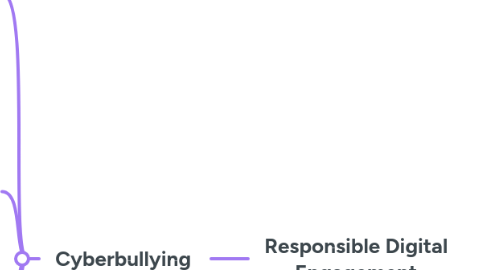
1. Digital Ethics
1.1. **Privacy & Data Security**
1.1.1. Personal data protection
1.1.2. Ethical hacking vs. malicious hacking
1.1.3. Informed consent for data collection
1.2. Online Behaviour & Responsibility
1.2.1. Digital footprint & online reputation
1.2.2. Ethical content sharing
1.2.3. Misinformation & fake news
1.3. AI & Ethics
1.3.1. Bias in algorithms
1.3.2. Deepfakes & their implications
1.3.3. Ethical AI in social media & advertising
1.4. Legal & Policy Frameworks
1.4.1. GDPR & data protection laws
1.4.2. Copyright laws & intellectual property
1.4.3. Online surveillance & government regulations
2. Cyberbullying
2.1. Types of Cyberbullying
2.1.1. Trolling & hate speech
2.1.2. Impersonation & catfishing
2.1.3. Doxxing (leaking personal information)
2.1.4. Harassment (repeated insults & threats)
2.2. Psychological & Social Impacts
2.2.1. Escalation to self-harm or suicide
2.2.2. Social isolation & school/work impact
2.2.3. Anxiety, depression & low self-esteem
2.3. Prevention & Intervention
2.3.1. Support networks (schools, workplaces, legal aid)
2.3.2. Reporting & blocking mechanisms
2.3.3. Digital literacy & awareness programs
2.4. Legal Consequences
2.4.1. Cyberbullying laws & penalties
2.4.2. School & workplace policies
2.4.3. Parental & educator responsibilities
